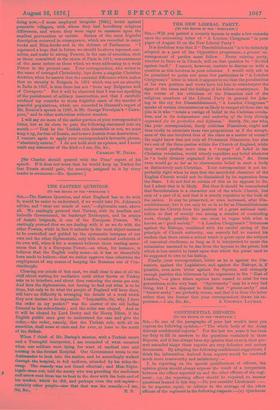THE NEW LIBERAL PARTY.
(TO THE EDITOR OF THE "SPECTATOR.")
SIR,—Will you permit a country layman to make a few remarks upon the interesting letter of "A London Clergyman" in your paper of August 19 on the New Liberal Party ?
It is doubtless true that if" Disestablishment " is to be definitely adopted as a part of the Opposition programme, a greater re- arrangement of parties must follow. Every existing party, whether in State or in Church, will on that question be "divided against itself." I cannot, however, venture to discuss so wide a question as this involves in your columns. I would only ask to be permitted to point out some few particulars in "A London Clergyman's" letter in which it appears to me that the peculiarities of his own position and views have led him to misinterpret the signs of the times and the feelings of his fellow-countrymen. In the course of his criticisms of the Dissenters and of the religious members of the Liberal Party in general for join- ing in the cry for Disestablishment, "A London Clergyman" speaks of certain circumstances as likely to compel all those also to join in it who "retain a vestige of belief in the Christian revela- tion, and in the independence and authority of the body divinely organised for its protection and diffusion." Surely, Sir, one who, like your correspondent, freely criticises Dissenters, ought not thus coolly to enunciate these two propositions as if the accept- ance of the one involved that of the other as a matter of course? He might know that not only all Protestant Dissenters, but also two out of the three parties within the Church of England, while they would profess more than a " vestige " of belief in the Christian revelation, would utterly repudiate any belief whatever in "a body divinely organised for its protection," en. Some even would go so far as to characterise belief in such a body as distinctively anti-Christian. Your correspondent is not im- probably right when he says that the sacerdotal character of the English Church would not be diminished by its separation from the State. I do not feel so certain of this as he appears to do, but I admit that it is likely. But then it should be remembered that Sacerdotalism is a character not of the whole Church, but only of a part of it, and that it is utterly repulsive to the bulk of the nation. It may be preserved, or even increased, after Die- establishment, but it can only be so in so far as Disestablishment reduces the Church from the position of a great national insti- tution to that of merely one among a number of contending sects, though possibly the one most in vogue with what is known as "good society." "A London Clergyman's" bitterness against the Bishops, combined with his careful saving of the principle of Church authority, can scarcely fail to remind his readers that there exists a school which is great upon the subject of canonical obedience, SO long as it is interpreted to mean the submission assumed to be due from the layman to the priest, but which is less careful to insist upon that which the priest used to be supposed to owe to his bishop.
Finally, your correspondent, bitter as he is against the Dis- senters, against the Legislature, and against the Bishops, is, if possible, even more bitter against the Squires, and strangely enough justifies this bitterness by his experience in the "East of London,"—a place where squires have ceased to exist for two generations, at the very least. "Squirearchy" may be a very bad thing, but I am disposed to think that " grocer-archy " and " brewer-archy " are probably worse, and that it is from the latter rather than the former that your correspondent draws his ex-


































 Previous page
Previous page